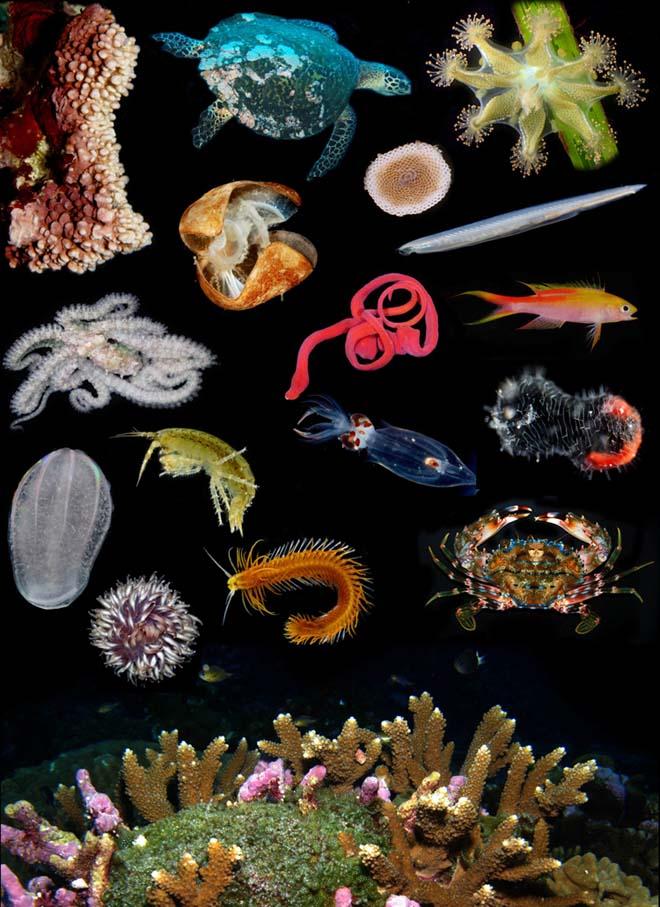Observations could signal threats to ecosystems we depend on
by WHOI on 28 Apr 2013

Marine biodiversity is key to ocean health and human well-being. Courtesy of Gustav Paulay and Steve Haddock
http://www.whoi.edu/
A group of oceanographic experts are seeking the establishment of a national network to monitor the diversity of marine life, a key bellwether of ocean and human health. Their work is described in the April 11 issue of BioScience.
Lead author, Professor J. Emmett Duffy of William & Mary's Virginia Institute of Marine Science and his co-authors, including Heidi Sosik, a biologist with the Woods Hole Oceanographic Institution (WHOI), say a comprehensive marine biodiversity observation network should be a national priority and could be established with modest funding within five years. The other authors hail from the Marine Biological Laboratory in Woods Hole, Massachusetts, the University of Kansas, the Florida Museum of Natural History, the University of Rhode Island’s Graduate School of Oceanography, and the University of California Davis.
'Biodiversity of the oceans is so central for human and ecosystem health alike,' says Sosik. 'We hope to bring much-needed attention to the ways scientists, resource managers, and concerned citizens can act now and come together to support a Marine Biodiversity Observing Network.'
Sosik is a member of the steering committee that developed and convened a three-day workshop on Attaining an Operational Marine Biodiversity Observation Network in May 2010. The workshop had sponsorship from seven federal agencies with participation by 35 invited scientists from the U.S. and abroad and 13 agency representatives. The paper provides a summary of the synthesis and recommendations generated from the workshop.
'It surprised me how quickly and unanimously the expert participants in our workshop were able to find consensus on specific and realistic recommendations for action,' Sosik says. 'We all recognize how threatened marine habitats are from humans by impacts such as climate change, pollution, overfishing, habitat destruction, and invasive species. It is critically important to protect the ocean’s biodiversity.'
To be most effective, the authors say, a biodiversity observation network would monitor biodiversity at all biological levels, from microscopic genes to regional ecosystems. It would also link observations of biodiversity to the physical factors controlling sea life such as water temperature and water quality, and be flexible enough to detect and track emerging issues as environmental conditions change.
The authors also stress that an observing network for marine biodiversity should be 'designed by nature, not people.'
Says Duffy, 'The location of the network’s individual sites should be based on where organisms live, and on factors like water temperature and currents, rather than on political boundaries. That will ensure that insights into biodiversity change and its causes are environmentally relevant.'
They envision a network with sites along both the East and West coasts of the United States, with other nodes focusing on the deep sea and coral reefs. A U.S. network would complement regional efforts already underway in the European Union, New Zealand, and elsewhere, and could incorporate technology and lessons learned from existing 'ocean observing systems' that focus on measurements of physical factors such as water temperature, wave height, current speed and direction, salinity, and oxygen levels. Such an observing system is in place off Martha’s Vineyard, Mass., the Martha’s Vineyard Coastal Observatory, a leading research and engineering facility operated by Woods Hole Oceanographic Institution that provides real time and archived coastal oceanographic and meteorological data for researchers, students and the general public.
The technology for a marine biodiversity observation network already exists in the form of high-tech gear such as AUVs (autonomous underwater vehicles), ROVs (remotely operated vehicles), ocean drifters, monitoring buoys, and automated optical and acoustic sensors (such as the Video Plankton Recorder, Imaging FlowCytobot, HabCam, and the DMON whale monitoring system, all developed at WHOI). These would complement and extend ship- and shore-based research efforts, both by academic researchers and a cadre of citizen scientists.
'Developing human resources is as important as technical innovation in creating a successful network,' the authors write. 'To maximize participation and accessibility, [the network] should . . . result in products that are widely usable. Creative use of citizen science could also broaden support, engage the public, and reduce costs.' Collected data—whether from new observations or historical research—would be made readily accessible online, allowing for analysis of current conditions and long-term trends.
An important recommendation emerging from this study is for immediate action to launch one or more integrated marine biodiversity observation network (MBON) demonstration projects. A comprehensive MBON will necessarily mature gradually, but we cannot afford to delay initiating an end-to-end observation program that spans from genes to ecosystem function.
The Woods Hole Oceanographic Institution is a private, non-profit organization on Cape Cod, Mass., dedicated to marine research, engineering, and higher education. Established in 1930 on a recommendation from the National Academy of Sciences, its primary mission is to understand the oceans and their interaction with the Earth as a whole, and to communicate a basic understanding of the oceans' role in the changing global environment.
If you want to link to this article then please use this URL: www.sail-world.com/108934